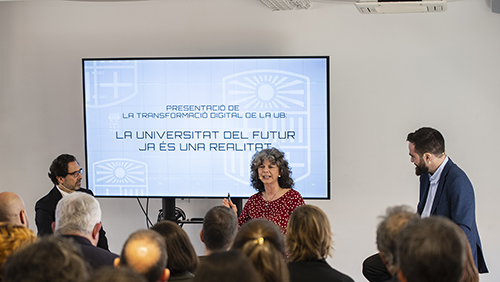The university of the future is now

Years ago, one of the pioneers of modern management, Peter Drucker, said that in an environment of rapid transformation, the only thing that guarantees the survival of organisations is the leadership of change: "Long-term planning is not thinking about future decisions, but about the future of present decisions". This is a message that the University of Barcelona has had very much in mind for some time now, and which is now taking at its highest expression as a prelude to a digital transformation that will change the institution from top to bottom and which will have its greatest exponent in the new website.

Years ago, one of the pioneers of modern management, Peter Drucker, said that in an environment of rapid transformation, the only thing that guarantees the survival of organisations is the leadership of change: "Long-term planning is not thinking about future decisions, but about the future of present decisions". This is a message that the University of Barcelona has had very much in mind for some time now, and which is now taking at its highest expression as a prelude to a digital transformation that will change the institution from top to bottom and which will have its greatest exponent in the new website.
The new website will be launched on 14 March, a date marked in red from which the UB's digital strategy takes off at a cruising speed. For two years, a team of 38 people from the Department of Communication and Information Technologies has worked intensively to deliver the first phase of a website that "changes the architecture and the content tree, increases security, allows the permanent updating of the content of the programmes offered by the UB and significantly improves navigation", as stated by the vice-rector for Digital Transformation, Xavier Triadó. The new interface solves a historical shortcoming, since it will have a double search engine, one with the Google engine, which will make it easy to find any information related to the University of Barcelona. A second phase will be underway, and it will affect the websites of the UB's faculties, units and services.
Xavier Marcet, consultant on corporate strategy, innovation and entrepreneurship and president of Lead to Change, believes that digital transformation does not depend so much on technology, but on the "organisational culture and people's ability to adapt". Regarding the universities, "organisations with a slow organisational rhythm", Marcet recommends finding a unique mix that combines the analogue and digital parts. "Consensus-building is slow [in universities]. Agility is therefore a strategic challenge. The world waits for no one", says the consultant.
Vice-rector Triadó puts emphasis on the acquisition of digital competences and the adoption of cultural change as two essential core ideas in the digitization of the university. "Adopting technology does not necessarily mean a change in strategies or values, and we usually confuse this. It is necessary to develop processes that are compatible with the tasks we already do well but that generate value in teaching and learning", he notes.
Pillars of the UB's digital transformation
The UB's digital transformation process consists of six main areas, in addition to the renewal of the institutional website. These axes are the consolidation of the Soc UB app as a central tool for communication with the university community; the implementation of the Student Smart Zone; progress in digital administration; the strengthening of cybersecurity; and the improvement of teaching at the UB through hybrid classrooms, an ambitious strategy sponsored by the UniDigital plan, developed by the Spanish Ministry of Universities to achieve the digitization of the university system. The University of Barcelona has 3.5 million euros to develop eight projects for this purpose (five inter-university, i.e. in collaboration with other universities) and three of its own.
"UniDigital has two distinct aspects: the former, to renew or implement existing technology in universities and, the latter, to change the dynamics of operation and learning", explains Marga Bonmatí, vice-president for Digital Transformation and Data at the UB. "This involves, therefore, improving the digital competences of the people who are part of the university (students, administrative and services staff and teaching and research staff), and implementing the use of digital tools and solutions as teaching elements.
Among the inter-university projects, Bonmatí highlights the Generation of Content for the Development of Digital Competence, coordinated by the UB, which will be "a turning point to give resources to those who have to make things change, basically PDI and PAS". On LEAN-Learning Analytics, coordinated by the Technical University of Catalonia, she explains: "It aims to analyse all the data we have in relation to students, in order to make predictions and provide a better quality, proactive and personalised service".
The UB's own projects cover three main areas: the adaptation of the University's Wi-Fi network, extending coverage to all UB centres thanks to the installation of 250 new access points and improving the quality of connectivity; the implementation of the Student Smart Zone; and the digitisation of learning environments (DIGAPREN). "The Student Smart Zone project consists of providing students with a space where they can find everything that is of their interest: academic records, teaching information and recommendations based on their needs and interests. It consists of unifying all the services available to students (UB World, Virtual Campus, Soc UB app, etc.) on a single platform", says Bonmatí. As for DIGAPREN, the aim is to "expand the number of hybrid classrooms (HALC: Hybrid Active Learning Classrom)" that allow different modes of interaction between students and teachers, and implement training activities through the use of tools that promote "active learning through simulation practices, virtual reality and augmented reality". UniDigital projects should be arranged during 2023.
The pandemic, a turning point
Montse Bachs, director of the Department of Information and Communication Technologies of the University, explains that March 2020 marked a turning point in the digitalization of the institution: "A university that was highly ‘everything face-to-face’ had to adapt to online teaching in record time. We took on many important attitudes and learnings to accelerate the digital transformation". Bachs gives as an example the adaptation to collaborative work environments, such as Microsoft Teams: "The university community has gotten used to communicating or holding meetings virtually, saving travel and optimising time".
Bachs explains that the ICT Department provides "customized support" to UB staff: "We have staff distributed throughout the campuses who provide first-hand help to the users. We are talking about both technical support and advice on the use of new technological tools”.
Cybersecurity is one of the priorities on which the Vice-Rector's Office for Digital Transformation is putting a strong emphasis. Actions in this regard are aimed both at strengthening the University's network, with actions such as the implementation of double authentication, and at training UB staff against phishing for credentials, developing campaigns to raise awareness of the danger of these cyber-attacks. "The ethical phishing campaigns that we launched have been very useful in advancing the acquisition of digital skills and, above all, in identifying the threats we face as users working in a big institution", says Xavier Triadó.
A digital and face-to-face university
"Digitising does not mean losing face-to-face activities, it means making them more powerful and more flexible, sometimes. Face-to-face learning provides a much more complete experience. Learning by doing is increasingly complemented by learning by living, which is eminently face-to-face. Moreover, the great challenge of digitalised face-to-face learning is to create large spaces for concentration and socialisation, where the learning experience is memorable", says Xavier Marcet.
Triadó concludes by highlighting this idea: "I always talk about adding, never replacing. As an institution, we must go with the people, help each other to grow with the competencies and skills each one of us. And this must be promoted with the collaboration of many people throughout the organisation".
Multimedia gallery

